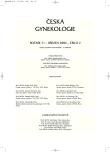-
Medical journals
- Career
Hematological Aspects of Gestational Cholestatic Hepatosis (ICP)
Authors: T. Binder 1; P. Salaj 2; J. E. Dyr 2; M. Vaníčková 2; I. Hrachovinová 2
Authors‘ workplace: Gynekologicko-porodnická klinika 2. LF UK a FN Motol, Praha, přednosta doc. MUDr. L. Rob, CSc. 1; Ústav hematologie a krevní transfuze, Praha, ředitel prof. MUDr. P. Klener, DrSc. 2
Published in: Ceska Gynekol 2006; 71(2): 99-102
Category: Original Article
Overview
Aim of the Study:
To assess the changes of hemocoagulative parametres induced by ICP from the view of posssible affection of the hemostasis.Seating:
Department of Obstet. Gynecol. 2nd Medical School Charles University and Teaching Hospital Motol, Prague, Institute of Haematology and Blood Transfusion Prague.Methodology:
20 blood samples of the pregnant with severe signs of ICP underwent the precise hemocoagulative analysis. The control group was composed from 12 women with physiological course of pregnancy comparable in terms of gestational week, age and parity.Results:
The routine hemocoagulative tests did show any statistical significant difference between both groups of examined women. The statisticaly significant elevation was found in women with ICP in factor VIII (fVIII:C), vWf and in the serum levels of fibrinogen. The elevated levels of fibrinogen did not influence the function of platelets and even the analysis of fibrinogen itself did not show any significant differences. Clinically assessed peripartal blood loss did not deviate from average of loss during the spontaneous labor of healthy women.Conclusions:
The changes in hemocoagulative parametres in patients with ICP do not increase the risk of thromboembolic events during pregnancy and labor. We also did not approve the risk of the higher peripartal blood loss in these patinets.Key words:
intrahepatic cholestasis of pregnancy, hemocoagulative parametres, peripartal blood loss
Labels
Paediatric gynaecology Gynaecology and obstetrics Reproduction medicine
Article was published inCzech Gynaecology

2006 Issue 2-
All articles in this issue
- Analysis of Stagnation of Perinatal Mortality in the Czech Republic
- Ursodeoxycholic Acid, S-adenosyl-L-methionine and their Combinations in the Treatment of Gestational Intrahepatic Cholestasis (ICP)
- Hematological Aspects of Gestational Cholestatic Hepatosis (ICP)
- Doula – a New Model of Delivery (continuous, nonprofessional care during the delivery)
- Embryo Quality Evaluation According to the Speed of the first Cleavage after Conventional IVF
- Inhibin B and Intraacrosomal Proteins in Men from the Couples with Fertility Disorders
- Prenatal Detection of Congenital Mezoblastic Nephroma
- Radical Parametrectomy in Women with Invasive Cervix Cancer after Previous Simple Hysterectomy
- Antibodies against the Chlamydial Heat Shock Protein in Women with Periadnexal Adhesions
- Serum Amyloid A as an Effective Marker for the Assessment of Surgical Trauma and Risk of Post-operative Complications
- Syndrome of Persistent Low Levels of Human Chorionic Gonadotrophin (hCG)
- New Method for Detection of Nonpalpable Breast Cancer
- Possibilities to Use the Aromatase Inhibitors for the Treatment of the Uterine Fibroids
- Czech Gynaecology
- Journal archive
- Current issue
- Online only
- About the journal
Most read in this issue- Embryo Quality Evaluation According to the Speed of the first Cleavage after Conventional IVF
- Serum Amyloid A as an Effective Marker for the Assessment of Surgical Trauma and Risk of Post-operative Complications
- Radical Parametrectomy in Women with Invasive Cervix Cancer after Previous Simple Hysterectomy
- Ursodeoxycholic Acid, S-adenosyl-L-methionine and their Combinations in the Treatment of Gestational Intrahepatic Cholestasis (ICP)
Login#ADS_BOTTOM_SCRIPTS#Forgotten passwordEnter the email address that you registered with. We will send you instructions on how to set a new password.
- Career

